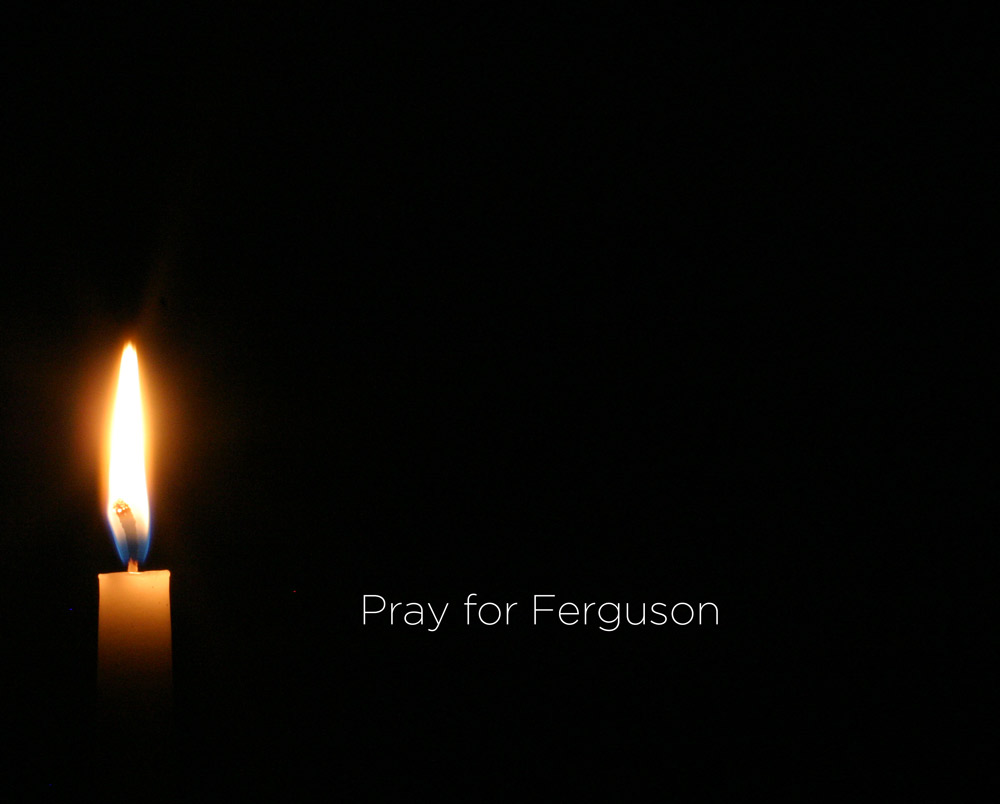Ferguson

Early on the first Sunday of Advent, I logged in to Pandora and heard the familiar chant “Adoro Te Devote.”
As a child, I knew Thomas Aquinas’ beloved text as “Humbly I Adore Thee.” At that time, faith meant standing with my family in the family church and singing such hymns with devotion.
The joining in song and prayer drew me closer to God. Or so I thought.
Later, as my life became more challenging and as I entered a world that seemed largely untouched by faith — a world where hatred, greed, violence and arrogance had free rein — I wondered if faith needed to be something more.
More rigorous, perhaps, deeper than a child’s cozy feelings. Faith needed to embrace more than lingering echoes of days gone by. Faith needed to address today’s cruelties and sadness. Faith needed to confront warfare, prejudice and unwarranted privilege.
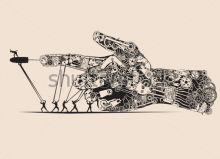
Peace, with its connotation of tranquility and stillness, is the Christian’s most misunderstood concept. We have long sought to keep peace by silencing dissent under the guise of pursuing unity, coated with a zealous concern for niceties, unwilling to budge a status quo. We forget to ask the crucial question: for whom do we keep peace?
Wherever peace is elusive, the first ones to suffer are the vulnerable.
When corporations engage in legal battles, employees who don’t get a vote have the most at stake. When marital tensions rise high, children’s tender spirits lay at the parents’ mercy. When war ravages a country, the displaced peoples helplessly suffer.
When keeping the peace only benefits the powerful, it is not a Christian peace. The sweet baby Jesus portrayed in sentimental Christmas cards has taken an abrupt departure from the kind of peace we see Jesus embody in Scripture. Even as an infant, the baby Jesus so disrupted the power authorities of the day that sent them scrambling into every home killing firstborn baby boys.
Christian peace is not about coddling people’s fear of conflict. It isn’t about making sure everyone is comfortable. It does not silence those for whom a lack of peace is a life or death situation. The irony is that often, the ones with feeble power are the ones who are told to keep peace and remain silent.
When the society is disrupted by scandalizing conflict — whether it is the Bill Cosby rape accusations, or the “harsh disciplinary methods” of certain celebrity parents, or an entire neighborhood weary of losing their young men to police violence — the Christian dare not keep peace by silencing the voice of the victims.



Editor’s Note: On Monday night, it was announced that a grand jury in St. Louis County found no probable cause to indict Ferguson, Mo., police officer Darren Wilson on any of five possible counts. Throughout the country, protests have erupted. For this week’s edition of the Weekly Wrap, we wanted to offer you the 10 most important things you should see, read, digest to understand the situation. We pray for peace.
1. Letter From Birmingham Jail
by Martin Luther King Jr. Far more relevant than it should be. Print it out. Write on it. Pray through it. "In the midst of blatant injustices inflicted upon the Negro, I have watched white churchmen stand on the sideline and mouth pious irrelevancies and sanctimonious trivialities."
2. PHOTOS: Scenes From Ferguson — and Beyond
Slate compiled these chilling shots from protests in Ferguson, New York City, Los Angeles, Washington, D.C., and more.
3. A Sad Night for America
“It is time to right the unacceptable wrong of black lives being worth less than white lives in our criminal justice system." our criminal justice system."
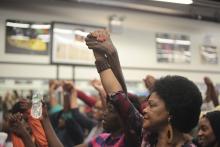
We must engage in courageous conversations. We need to have them in and amongst our own people—our families and our children, our close friends and allies, and in our racial/ethnic groups. A caucus can be an important thing. Make space for the asking of deep questions and the sharing of even awkward sentiments. Why is this happening? What does it mean? How does it affect my soul? Aren’t we past race yet, and can I do anything about this? How does my faith in God relate to these issues? How can I be a healer?
And we must have these conversations across what might seem to be natural divides. We need to have cross-racial/cross ethnic conversations. In order to do this, we must have relationships. We can’t liberate each other while we are in silos. Multiracial/multiethnic congregations like Middle Collegiate Church are critical to the work of racial reconciliation. If your church is diverse, think of ways to encourage deeper relationships. In our context, we have an ongoing small group called Erasing Racism, in which we are having critical conversations about race. If your context is mono-cultural, find a partner with whom to relate. Create a joint worship celebration or prayer vigil during Advent and have conversation as you break bread. Use questions like: When was the first time I was othered due to my personhood? When have I othered someone else? How can these experiences plant seeds for empathy? How did I learn the story of race and what can I do to change it?


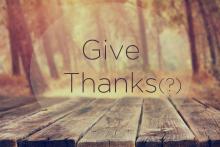
Are you feeling pressure to be thankful?
We are in the midst of the Thanksgiving season. I’m reminded everywhere I go to “Be thankful!”
Well, call me the Scrooge of Thanksgiving, but I’m just not feeling thankful. The more someone tells me to “Be thankful!” the more I feel a sense of despair.
Be thankful? In the midst of Ferguson, Mo.? Jim Wallis writes that, “Many black families woke up this morning knowing that the lives of their children are worth less than the lives of white children in America.” And what will white America do about it? Nothing new. One side will continue the status quo of racism by denying that it even exists and then they will blame the victims. I firmly stand in the other side that blames America’s deeply embedded structures of racism, economic injustice, and educational inequality. To make matters worse, America is sharply divided over the shooting in Ferguson. Each side of the division blames the other for tragic violence. Sunday’s heated debate on Meet the Press between former New York Mayor Rudy Giuliani and Georgetown Professor Michael Eric Dyson is indicative of the deep racial tensions underlying not only Ferguson, but every city in the United States.
My Facebook news feed and the media are telling me how I’m supposed to feel about Ferguson. Outraged. Hurt. Anxious. Guilt. Anger. Bitter. But certainly not thankful.
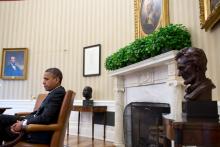
The shooting of Michael Brown and the failure of a grand jury to indict the shooter, Darren Wilson, are symptoms of a wider malaise.
It is part of a deep-seated illness that infects our body politic: racism.
The sad reality is that so many people believe we live in a post-racial society because we have a black president. We cannot address the issue, challenge ourselves and transform our societies without a prophetic voice. Ferguson is the space where I see that voice re-emerging into America’s consciousness.
Racism is not just about individual acts. It is about a system that allows unarmed black boys to be shot at a rate 20 times that of white boys; it allows a prosecutor to deliver a speech as a defense attorney for the accused after he fails to get an indictment. It is a system that has a black president telling people to calm down as the police, in military gear, attack them.
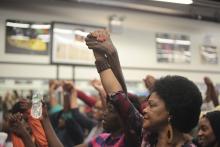
Every now and then something scars the “national memory,” and we encounter ourselves as a single people. We grieve as one or we celebrate as one.
Those moments are rare, and maybe they should be rare. It would be artificial for a people as divided as we are to pretend to a national consciousness. We don’t agree on the facts, we don’t agree on our own history, we don’t agree on meaning and ethics, we don’t like each other, and we certainly don’t trust each other.
Now, to echo President Abraham Lincoln at Gettysburg 151 years ago, we are met on a great battlefield of the wars we wage against each other. It isn’t a field in central Pennsylvania. It is the nation itself.
Cities are set to explode over worsening racial injustice and police misconduct. Football players get a free pass on domestic violence. Colleges shrug off epidemics of rape and cheating.
Banks and a small moneyed set wage unrelenting war on their fellow Americans. Descendants of immigrants turn against new arrivals and call it patriotism. Large companies like General Motors sell defective products. Lobbyists control our legislators, and they in turn deny votes and basic rights to certain citizens.
The question, then, is the one President Lincoln posed: Can a nation so wounded by its divisions, hatreds and manipulated fears survive? Are we setting the stage for even more repressive surveillance, even worse predations by the government-owning few, even more weapons in unstable hands, even worse despair among the many?

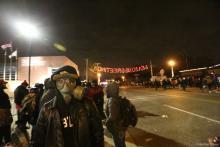
Many black families woke up this morning knowing that the lives of their children are worth less than the lives of white children in America. The deep distrust of law enforcement in their own communities that so many African Americans feel just got deeper last night — 108 days since the killing of unarmed teenager Michael Brown — when the prosecuting attorney announced the decision not to subject the police officer who killed Brown to a trial where all the facts could be publically known and examined.
We now all have the chance to examine the evidence — released last night — in the grand jury’s decision not to indict white police officer Darren Wilson, who fired multiple bullets into Michael Brown. But the verdict on America’s criminal justice system is already in for many Americans: guilty, for treating young black men differently than young white men.

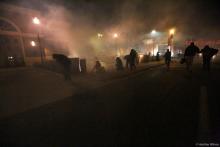
In a blog I wrote less than two weeks ago, “Justice ... not ‘Just Us’,” I asserted, “Our lives are constituted by relationships. The question is, ‘what is the nature of these relationships?’” I also asserted, “Exploitative relationships result in situations of ‘just us’ rather than justice.”
As I sat listening to Robert P. McCulloch, the St. Louis County prosecutor, return the grand jury’s decision to not indict Officer Darren Wilson for the fatal shooting of “Mr. Brown,” I kept waiting to hear comments regarding how or why Wilson was justified in firing several shots at an unarmed teenager.
After spending several minutes complaining about the news coverage and the use of social media, the county prosecutor began detailing the inconsistency of eyewitness testimony and the reliability of “physical and scientific evidence.” It was obvious at the outset that the prosecutor was setting the stage for the grand jury’s verdict by discrediting any and all witness accounts that suggested Michael Brown was surrendering or had his hands up before Wilson shot him several times.
While I was not surprised by the grand jury’s verdict, what I found disappointing in this case and continue to find disappointing in cases like this one, is the failure to discuss the use of “excessive force” by police. While giving his prepared remarks, McCulloch made no comments regarding Wilson’s use of deadly force against an unarmed 18-year-old man.
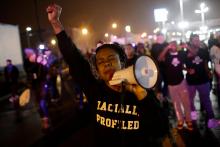
A grand jury has found that no probable cause exists to indict Darren Wilson, the Ferguson, Mo., police officer who shot and killed 18-year-old Michael Brown, on Aug. 9, said St. Louis County Prosecuting Attorney Robert P. McCulloch on Monday evening.
McCulloch said the grand jury was instructed on the law and presented on five possible indictments. He emphasized that the jurors "are the only people who have heard and examined every witness and every piece of evidence."
Protests throughout the St. Louis metro area — as well as nearly 100 cities across the country — are planned in response to the decision. Last week, Missouri Gov. Jay Nixon declared a preemptive state of emergency and activated the National Guard to respond to “any period of unrest that might occur following the grand jury’s decision concerning the investigation into the death of Michael Brown.” Rev. Traci Blackmon, a clergy leader in the St. Louis area, recently told Sojourners that while the city and county police departments have amassed weapons and riot gear to react to the protests, local community leaders and faith groups have been stocking up on bandages and first-aid materials.
Earlier in the day Brown’s family asked for 4.5 minutes of silence this evening before protests begin — a statement on the 4.5 hours Michael Brown’s body was left in a Ferguson street following the shooting.
The Justice Department is conducting its own federal investigation, however recent reports have indicated that it is not likely to result in civil rights charges against Wilson.
Stay tuned to Sojourners for continued updates and analysis.
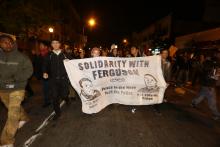
In an intimate conversation between Jesus and his disciples, just before Jesus predicts that Peter will deny him three times, Jesus asks Peter, “Will you lay down your life for me?” As Jesus’ crucifixion approaches, his question to Peter becomes reality, and the people who know of Jesus or his movement must make a choice — to suffer and die with Jesus, or to slip away in fear and passivity — to welcome Christ, or to reject Christ.
Peter is certainly not the only one to face this decision. Judas must choose to betray Christ or not; the high priests must choose between power and mercy; Pilate must choose the approval of the people or trust his own conscience. These individuals, however, do not stand alone in their decision-making, but among one of the strongest but often overlooked characters in Scripture — the crowd. As Jesus stands before Pilate, it is not Pilate who truly holds power — it is the raging crowd before him that demands for the freedom of Barabbas and the crucifixion of Jesus.
When looking back on the crowd’s decision, it is easy to see how wrong it was until we begin to ask where we stand among the crowd in our time. In the case of Ferguson and the grand jury’s decision on Darren Wilson, most of us stand in the crowd, waiting to see what the grand jury and the state may do while we decide what we must do. All eyes are on the jury, yet many of us who are watching realize that the real power does not reside in Gov. Jay Nixon or the grand jury, but in us. Just as it is the crowd who sways Pilate to crucify Jesus, so it is we who can determine whether justice comes in Ferguson and everywhere where racism exists. As bell hooks writes, “Whether or not any of us become racists is a choice we make. And we are called to choose again and again where we stand on the issue of racism in different moments of our lives.” Today, we have another choice. The grand jury is under the spotlight, but we are all responsible.
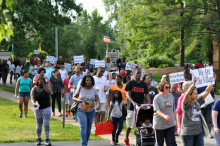
After a prayer service outside her church turned violent last month, the Rev. Teresa Danieley, pastor of St. John’s Tower Grove, allowed those trying to escape the demonstrations to enter her church.
Now, Danieley and dozens of other clergy members are preparing to once again offer their churches as safe spaces, or sanctuaries.
The grand jury decision on whether to indict Darren Wilson, the officer who fatally shot African-American teenager Michael Brown, is expected by the end of the month, potentially triggering further civil unrest. Clergy anticipate some might seek refuge in churches, whether to escape violence or find fellowship.
Organizations such as the Don’t Shoot Coalition, which was formed after the death of Brown, and Metropolitan Congregations United, a group of interdenominational, multiracial congregations from around the region, are in the process of creating a list of churches that are volunteering the use of their space. Many of these churches will be packed with supplies such as food, water, and phone chargers. Medics, legal observers and counselors will also be on hand.
Some believe that unless officers are needed in an emergency, churches should also function as police-free zones during protests.
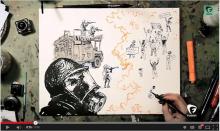
As the nation continues to wait for the grand jury’s decision whether or not to indict Darren Wilson for the killing of Mike Brown, one artist has connected the violent police acts in Ferguson to a broader narrative of state-sanctioned violence.
Molly Crabapple, known for her artistic contributions to Occupy Wall Street, combines the fast-paced style of dry-erase animation with colorful watercolor illustrations in her new video, ‘How Ferguson showed us the truth about police.’
WATCH:
